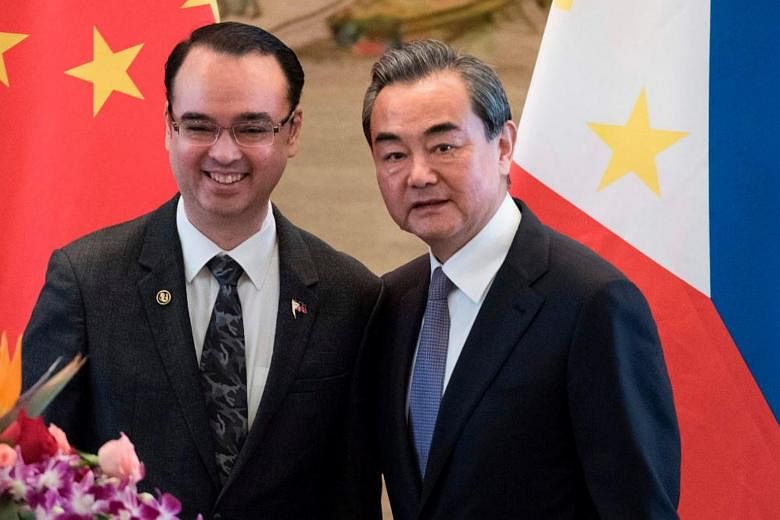BEIJING (Reuters) - Relations between China and the Philippines have entered a "golden period of fast development", Chinese Foreign Minister Wang Yi said on Thursday (June 29), touting growth in trade ties and bilateral efforts to settle disputes in the South China Sea.
Philippine President Rodrigo Duterte has opted to court China for its business and investment and avoid the rows over maritime sovereignty that dogged his predecessors.
Duterte has faced criticism at home for being what some people see as too soft on China over the long-running territorial dispute, but he considers his approach to be pragmatic and says challenging China risks triggering war.
Wang, speaking to reporters after meeting with Philippine Foreign Minister Alan Peter Cayetano in Beijing, said the two countries have signed 22 cooperative agreements in less than six months and China has become the Philippines' biggest trading partner for the first time.
"Our two countries have set up a bilateral consultation mechanism on the South China Sea issue and also a mechanism for cooperation between the coast guards," Wang said.
"If anyone wants to reverse the current progress it will harm the interests of the Philippine people and that is not what we would like to see," he said.
Cayetano said peace and stability in the East and South China Seas, as well as the whole region, was a tangible outcome of the recent improvement of relations with China.
He also praised Chinese President Xi Jinping's Belt and Road initiative to link countries through infrastructure development as "a big idea in a world that is searching and wanting for big ideas".
China claims most of the energy-rich South China Sea, through which about $5 trillion in ship-borne trade passes every year. Brunei, Malaysia, the Philippines, Taiwan and Vietnam also have claims in the waters, where China has been building up military facilities like runways on the islands it controls.
The previous Philippine government filed a case in 2013 with the Permanent Court of Arbitration in The Hague on maritime boundaries.
Last year the tribunal invalidated China's claim to sovereignty over most of the South China Sea, but Duterte has put the ruling on the back burner and said he will revisit it later in his term.
The United States has criticised China's construction in the disputed waters, concerned the facilities could be used to restrict free movement and extend China's strategic reach.
Under President Donald Trump, the United States has continued "freedom of navigation" exercises intended to show China that it is not entitled to territorial waters there.
Beijing says such actions by the United States heighten tensions and risk disrupting negotiations between stakeholders.
Separately, Chinese defence ministry spokesman Wu Qian told a regular monthly news briefing that China had provided a batch of "counter-terrorism materials" to the Philippines on Wednesday, though he gave no details.
Foreign Minister Wang said the Philippines was facing"severe challenges posed by terrorism".
"Of course, China will not hesitate in extending a helping hand to our close neighbour, the Philippines," he said. "In the future, in keeping with the Philippines' needs, we will continue to provide necessary assistance and help."

